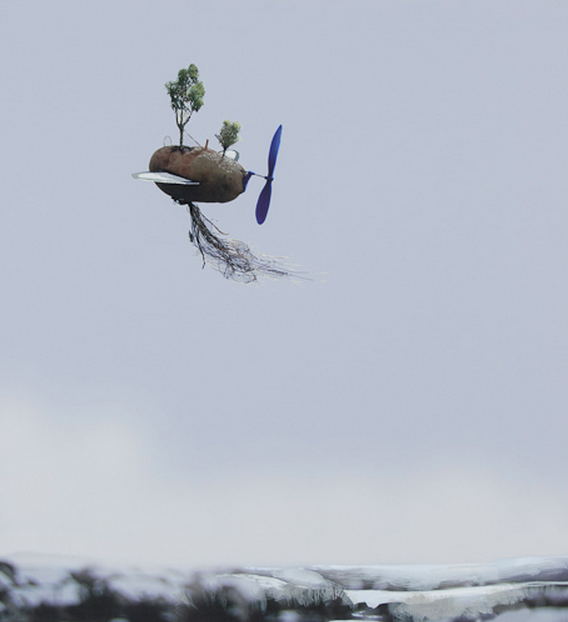
Sarah McCoubrey, Escape Vehicle: Fat Potato (2012).
Via Locks Gallery.
How will human beings escape from an Earth exhausted and left for dead by methane companies and their advocates? Artist Sarah McCoubrey has a suggestion: vehicular potatoes, a theme explored in the exhibit Sarah McCoubrey: Works on Paper, currently on view at the Everson Museum of Art in Syracuse, New York, closing August 24.
A landscape painter and a professor of art at Syracuse University, McCoubrey drew inspiration from hydrofracking sites across the Northeast and the industrial waste beds of Onondaga Lake in Syracuse, where she lives. A polluted landscape provides no reason to turn her eyes elsewhere; rather, it is fertile ground for inspiration, a place McCoubrey calls Eden. Her mixed-media works straddle the line between the real and the unreal, as she manipulates elements of nature to create a fantasy world that sparks viewers’ imaginations and is open to wide interpretation.
As explained in the wall text at the exhibition, McCoubrey begins by ‘planting’ outdoor sculptures composed of natural elements and human detritus she finds at the hydrofrcking sites. Then she makes digital prints of them, adding constructed, imaginary elements by hand.
The result is more than 20 works on paper, combining digital images, mixed media and ink drawings. They depict a combination of twisted branches; roots and mounds of earth; slender, damaged trees; industrial debris; and strange creatures emerging from toxic ooze and crawling across stretches of barren land.
One series has eight panels showing potatoes—one large potato per panel—in various states of departure. The tubers are taking off, fleeing the landscape either on foot or flying through the air.
Escape Vehicle: Fat Potato (2012) looks a little like a Goodyear Blimp, perhaps floating above a patchwork of farms and fields somewhere between Akron and Columbus; maybe it’s en route to an Ohio State Buckeye football game.
Sarah McCoubrey, Escape Vehicle: Fat Walking Potato (2012).
Via Locks Gallery.
Escape Vehicle: Potato With Propeller (2012), shows a potato with wings, a blue propeller, and two small trees sticking out of it. It’s flying from right to left over what looks like the snow-covered hills of upstate New York.
There is no doubt McCoubrey’s work is serious, as she calls attention to the damage of toxic waste and other threats to the environment. Her images portend a future world where the Earth seems to undergo a rebellion as the planet adjusts to cataclysmic changes. Yet she delivers her message softly by hooking viewers with her playful touch and characters that could be found in a Dalí painting or a Scholastic picture book.
Sarah McCoubrey, Escape Vehicle: Potato With Propeller (2012)
Via Locks Gallery.